2019年普通高等学校招生全国统一考试(全国卷I)英语真题(附答案)
2019年高考英语试题(全国Ⅰ卷)答案

2019年全国普通高等学校招生统一考试(全国Ⅰ卷)英语答案答案速查:第一部分听力1–5 BABCA 6–10 CBACC 11–15 BACAB 16–20 ACBAC第二部分阅读理解21–25 BDDBA 26–30 ACDCB 31–35 DCABA 36–40 EAGCD第三部分语言知识运用41–45 DCCBA 46–50 CDCAB 51–55 DABDA 56–60 CBDAB61.that 62.poorly 63.of/for 64.to perform 65.have reported 66.belief 67.noting 68.higher 69.the 70.are第二部分阅读理解第一节A体裁:应用文题材:广告主题:兼职活动【文章大意】本文介绍了学生在暑期可以兼职的四个项目。
21.B【解析】根据Summer Company中的“Summer Company provides students with hands-on business training and awards of up to $3,000 to start and run their own summer businesses”可知,这个项目给创业的学生提供高达三千美元的奖金。
Summer Company并没有提到在工作前不需要培训,故可排除A项;Summer Company没有提到工作环境,因此可排除C项;对比四个项目可知,这四个项目都是关于暑期工作的信息,Summer Company并没有提供更多的工作信息,因此可排除D项。
22.D【解析】本题问Stewardship Youth Ranger Program要求的参与活动的学生的年龄范围。
根据本部分中的“Who is eligible:Students aged 16 or 17 at time of hire, but not turning18 before December 31 this year”可知,学生的年龄应该在16–17岁,故选D。
【江苏卷】2019年普通高等学校招生全国统一考试英语真题(Word版,含答案)
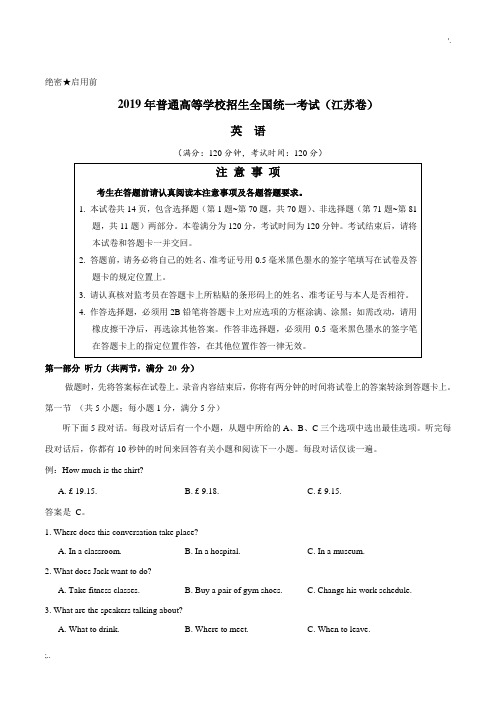
绝密★启用前2019年普通高等学校招生全国统一考试(江苏卷)英语(满分:120分钟,考试时间:120分)第一部分听力(共两节,满分20 分)做题时,先将答案标在试卷上。
录音内容结束后,你将有两分钟的时间将试卷上的答案转涂到答题卡上。
第一节(共5小题;每小题1分,满分5分)听下面5段对话。
每段对话后有一个小题,从题中所给的A、B、C三个选项中选出最佳选项。
听完每段对话后,你都有10秒钟的时间来回答有关小题和阅读下一小题。
每段对话仅读一遍。
例:How much is the shirt?A. £ 19.15.B. £ 9.18.C. £ 9.15.答案是C。
1. Where does this conversation take place?A. In a classroom.B. In a hospital.C. In a museum.2. What does Jack want to do?A. Take fitness classes.B. Buy a pair of gym shoes.C. Change his work schedule.3. What are the speakers talking about?A. What to drink.B. Where to meet.C. When to leave.4. What is the relationship between the speakers?A. Colleges.B. Classmates.C. Strangers.5. Why is Emily mentioned in the conversation?A. She might want a ticket.B. She is looking for the man.C. She has an extra ticket.第二节(共15小题;每小题1分,满分15分)听下面5段对话或独白。
2019年普通高等学校招生全国统一考试 真题 (英语 全国I卷) 含答案

2019年普通高等学校招生全国统一考试真题(英语全国I卷) 含答案第二部分阅读理解(共2节, 满分40分)第一节( 共15小题, 每小题2分, 满分30分)阅读下列短文, 从每题所给的A, B, C和D四个选项中, 选出最佳选项.ANeed a Job This Summer?The provincial government and its partners offer many programs to help students find summer jobs. The deadlines and what you need to apply depend on the program.Not a student? Go to the government website to learn about programs and online tools available to help people under 30 build kills, find a job or start businesses all year round.Jobs for YouthIf you are a teenager living in certain parts of the province, you could be eligible(符合条件) for this program, which provides eight weeks of paid employment along with training.Who is eligible: Y outh 15-I8 years old in select communities(社区).Summer CompanySummer Company provides students with hands on business training and awards of up to $ 3,000 to start and run their own summer businesses.Who is eligible: Students aged 15-29, returning to school in the fall.Stewardship Y outh Ranger ProgramYou could apply to be a Stewardship Youth Ranger and work on local natural resource management projects for eight weeks this summer.Who is eligible: Students aged 16 or 17 at time of hire, but not turning 18 before December 31 this year.Summer Employment Opportunities(机会)Through the Summer Employment Opportunities program, students are hired each year in a variety of summer positions across the Provincial Public Service, its related agencies and community groups.Who is eligible: Students aged 15 or older. Some positions require students to be I5 to24 or up to 29 for persons with a disability.( ) 21. What is special about Summer Company?A. It requires no training before employment.B. It provides awards for running new businesses.C. It allows one to work in the natural environment.D. It offers more summer job opportunities.( ) 22. What is the age range required by Stewardship Youth Ranger Program?A. 15-18.B. 15-24.C. 15-29.D. 16-17.( ) 23. Which program favors the disabled?A. Jobs for Youth.B. Summer Company.C. Stewardship Youth Ranger Program.D. Summer Employment OpportunitiesBFor Canaan Elementary’s second grade in Patchogue. N. Y., today is speech day, and right now it’s Chris Palaez’s turn. The 8-year-old is the joke of the class. With shinning dark eyes, he seems like the kind of kid who would enjoy public speaking.But he’s nervous. “I’m here to tell you today why you should … should…” Chris trips on the “-ld.” a pronunciation difficulty for many non-native English speakers. His teacher, Thomas Whaley, is next to him, whispering support. “…Vote for…me…”Except for some stumbles.Chris is doing amazingly well. When he brings his speech to a nice conclusion, Whaley invites the rest of the class to praise him.A son of immigrants, Chris started learning English a little over three years ago. Whaley recalls(回想) how at the beginning of the year, when called upon to read, Chris would excuse himself to go to the bathroom.Learning English as a second language can be a painful experience. What you need is a great teacher who lets you make mistakes. “It takes a lot for any student,” Whaley explains, “especially for a student who is learning English as their new language, to feel confident enough to say, ‘I don’t know, but I want to know.’ ”Whaley got the idea of this second-grade presidential campaign project when he asked the children one day to raise their hands if they thought they could never be a president. The answer broke his heart. Whaley says the project is about more than just learning to read and speak in public. He wants these kids to learn to boast (夸耀) about themselves.“Boasting about you rself, and your best qualities,”Whaley says, is very difficult for a child who came into the classroom not feeling confident.”( ) 24. What made Chris nervous?A. Telling a story.B. Making a speech.C. Taking a test.D. Answering a question.( ) 25. What does the underlined word “stumbles” in paragraph 2 refer to?A. Improper pauses.B. Bad manners.C. Spelling mistakes.D. Silly jokes.( ) 26. We can infer that the purpose of Whaley’s project is to _______.A. help students see their own strengthsB. assess students’ public speaking skillsC. prepare students for their future jobsD. inspire students love for politics( ) 27. Which of the following best describes Whaley as a teacher?A. Humorous.B. Ambitious.C. Caring.D. DemandingCAs data and identity theft becomes more and more common, the market is growing for biometric(生物测量) technologies--like fingerprint scans--to keep others out of private e-spaces. At present, these technologies are still expensive, though.Researchers from Georgia Tech say that they have come up with a low-cost device(装置) that gets around this problem: a smart keyboard. This smart keyboard precisely measures the cadence(节奏) with which one types and the pressure fingers apply to each key, The keyboard could offer a strong layer of security by analyzing things like the force of a user’s typing and the time between key presses. These patterns are unique to each person. Thus, the keyboard can determine people’s identities, and by extension, whether they should be given access to the computer it’s connected to--regardless of whether someone gets the password right.It also doesn’t require a new type of technology that people aren’t already familiar with. Everybody uses a keyboard and everybody types differently.In a study describing the technology, the researchers had 100 volunteers type the word “touch” four times using the smart keyboard. Data collected from the device could be used to recognize different participants based on how they typed, with very low error rates. The researchers say that the keyboard should be pretty straightforward to commercialize and is mostly made of inexpensive, plastic-like parts. The team hopes to make it to market in the near future.( ) 28. Why do the researchers develop the smart keyboard?A. To reduce pressure on keys.B. To improve accuracy in typingC. To replace the password system.D. To cut the cost of e-space protection.( ) 29. What makes the invention of the smart keyboard possible?A. Computers are much easier to operate.B. Fingerprint scanning techniques develop fast.C. Typing patterns vary from person to person.D. Data security measures are guaranteed.( ) 30. What do the researchers expect of the smart keyboard?A. It’ll be environment-friendly.B. It’ll reach consumers soon.C. I’ll be made of plastics.D. I t’ll help speed up typing.( ) 31. Where is this text most likely from?A. A diary.B. A guidebookC. A novel.D. A magazine.DDuring the rosy years of elementary schoo1(小学), I enjoyed sharing my dolls and jokes, which allowed me to keep my high social status. I was the queen of the playground. Then came my tweens and teens, and mean girls and cool kids. They rose in the ranks not by being friendly but by smoking cigarettes, breaking rules and playing jokes on others, among whom I soon found myself.Popularity is well-explored subject in social psychology. Mitch Prinstein, a professor of clinical psychology sorts the popular into two categories: the likable and the status seekers. The likables’plays-well-with-others qualities strengthen schoolyard friendships, jump-start interpersonal skills and, when tapped early, are employed ever after in life and work. Then there’s the kind of popularity that appears in adolescence: status born of power and even dishonorable behavior.Enviable as the cool kids may have seemed, Dr. Prinstein’s studies show unpleasant consequences. Those who were highest in status in high school, as well as those least liked in elementary school, are “most likely to engage(从事) in dangerous and risky behavior.”In one study, Dr. Prinstein examined the two types of popularity in 235 adolescents, scoring the least liked, the most liked and the highest in status based on student surveys (调查研究). “We found that the least well-liked teens had become more aggressive over time toward their classmates. But so had those who were high in status. It clearly showed that while likability can lead to healthy adjustment, high status has just the opposite effect on us.”Dr. Prinstein has also found that the qualities that made the neighbors want you on a play date---sharing, kindness, openness---carry over to later years and make you better able to relate and connect with others.In analyzing his and other research, Dr. Prinstein came to another conclusion: Not only is likability related to positive life outcomes, but it is also responsible for those outcomes, too. “Being liked creates opportunities for learning and for new kinds of life experiences that help somebody gain an advanta ge,” he said.( ) 32. What sort of girl was the author in her early years of elementary school?A. Unkind.B. Lonely.C. Generous.D. Cool.( ) 33. What is the second paragraph mainly about?A. The classification of the popular.B. The characteristics of adolescents.C. The importance of interpersonal skills.D. The causes of dishonorable behavior.( ) 34. What did Dr. Prinstein’s study find about the most liked kids?A. They appeared to be aggressive.B. They tended to be more adaptable.C. They enjoyed the highest status.D. They performed well academically.( ) 35 What is the best title for the text?A. Be Nice---You Won’t Finish LastB. The Higher the Status, the BetterC. Be the Best---You Can Make ItD. More Self-Control, Less Aggressiveness根据短文内容, 从短文后的选项中选出能填入空白处的最佳选项, 选项中有两项为多余选项.Is Fresh Air Really Good for You?We all grew up hearing people tell us to “go ou t and get some fresh air.” 36 According to recent studies, the answer is a big YES, if the air quality in your camping area is good.37 If the air you’re breathing is clean---which it would be if you’re away from the smog of cities---then the air is filled with life-giving, energizing oxygen. If you exercise out of doors, your body will learn to breathe more deeply, allowing even more oxygen to get to your muscles (肌肉) and your brain.Recently, people have begun studying the connection between the natural world and healing(治愈). 38. In these places patients can go to be near nature during their recovery. It turns out that just looking at green, growing things can reduce stress, lower blood pressure, and put people into a better mood (情绪). Greenery is good for us. Hospital patients who see tree branches out their window are likely to recover at a faster rate than patients who see buildings or sky instead. 39 It gives us a great feeling of peace.40 While the sun’s rays can age and harm our skin, they also give us beneficial Vitamin D. To make sure you get enough Vitamin D---but still protect your skin---put on sunscreen right as you head outside. It takes sunscreen about fifteen minutes to start working, and that’s plenty of time for your skin to absorb a day’s worth of Vitamin D.A. Fresh air cleans our lungs.B. So what are you waiting for?C. Being in nature refreshes us.D. Another side benefit of getting fresh air is sunlight.E. But is fresh air really as good for you as your mother always said?F. Just as importantly, we tend to associate fresh air with health care.G. All across the country, recovery centers have begun building Healing Gardens.第三部分语言知识运用(共两节, 满分45分)第一节(共20小题: 每小题1.5分, 满分30分)阅读下面短文, 从短文后各题所给的A, B, C和D四个选项中, 选出可以填入空白处的最佳选项。
2019年高考英语全国1卷(附答案)
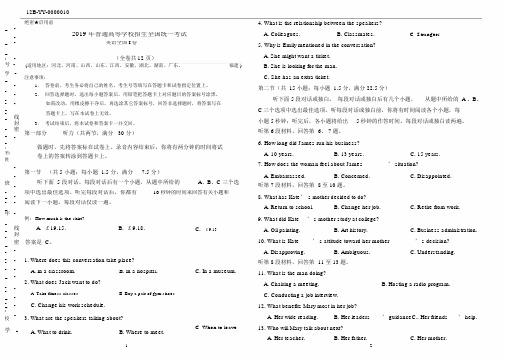
12B-YY-0000010-绝密★启用前__2019 年普通高等学校招生全国统一考试_-__-英语全国I卷__-(全卷共12 页):号 -(适用地区:河北、河南、山西、山东、江西、安徽、湖北、湖南、广东、福建 )学-注意事项:__-1.答卷前,考生务必将自己的姓名、考生号等填写在答题卡和试卷指定位置上。
___-2.回答选择题时,选出每小题答案后,用铅笔把答题卡上对应题目的答案标号涂黑。
___-如需改动,用橡皮擦干净后,再选涂其它答案标号,回答非选择题时,将答案写在___答题卡上,写在本试卷上无效。
_线__封3.考试结束后,将本试卷和答案卡一并交回。
__密_第一部分听力(共两节,满分 30 分)_-__做题时,先将答案标在试卷上。
录音内容结束后,你将有两分钟的时间将试:-名卷上的答案转涂到答题卡上。
姓--第一节(共 5 小题;每小题 1.5 分,满分7.5 分)-听下面 5 段对话。
每段对话后有一个小题,从题中所给的A、B、C 三个选班-__项中选出最佳选项。
听完每段对话后,你都有10 秒钟的时间来回答有关小题和_-__-阅读下一小题。
每段对话仅读一遍。
__4. What is the relationship between the speakers?A. Colleagues.B. Classmates.C. Strangers.5.Why is Emily mentioned in the conversation?A.She might want a ticket.B.She is looking for the man.C.She has an extra ticket.第二节(共 15小题;每小题 1.5分,满分 22.5分)听下面 5段对话或独白。
每段对话或独白后有几个小题,从题中所给的 A 、B、C三个选项中选出最佳选项。
听每段对话或独白前,你将有时间阅读各个小题,每小题 5秒钟;听完后,各小题将给出5秒钟的作答时间。
2019年高考 英语真题 (全国卷一) 完型填空 含答案
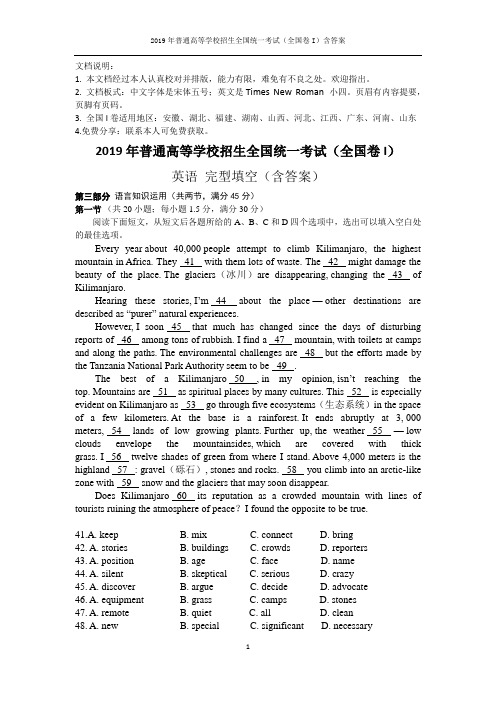
文档说明:1. 本文档经过本人认真校对并排版,能力有限,难免有不良之处。
欢迎指出。
2. 文档板式:中文字体是宋体五号;英文是Times New Roman 小四。
页眉有内容提要,页脚有页码。
3. 全国I卷适用地区:安徽、湖北、福建、湖南、山西、河北、江西、广东、河南、山东4.免费分享:联系本人可免费获取。
2019年普通高等学校招生全国统一考试(全国卷I)英语完型填空(含答案)第三部分语言知识运用(共两节,满分45分)第一节(共20小题;每小题1.5分,满分30分)阅读下面短文,从短文后各题所给的A、B、C和D四个选项中,选出可以填入空白处的最佳选项。
Every year about 40,000 people attempt to climb Kilimanjaro, the highest mountain in Africa. They 41 with them lots of waste. The 42 might damage the beauty of the place. The glaciers(冰川)are disappearing, changing the 43 of Kilimanjaro.Hearing these stories, I’m 44 about the place — other destinations are described as “purer” natural experiences.However, I soon 45 that much has changed since the days of disturbing reports of 46 among tons of rubbish. I find a 47 mountain, with toilets at camps and along the paths. The environmental challenges are 48 but the efforts made by the Tanzania National Park Authority seem to be 49 .The best of a Kilimanjaro 50 , in my opinion, isn’t reaching the top. Mountains are 51 as spiritual places by many cultures. This 52 is especially evident on Kilimanjaro as 53 go through five ecosystems(生态系统)in the space of a few kilometers. At the base is a rainforest. It ends abruptly at 3, 000 meters, 54 lands of low growing plants. Further up, the weather 55 — low clouds envelope the mountainsides, which are covered with thick grass. I 56 twelve shades of green from where I stand. Above 4,000 meters is the highland 57 : gravel(砾石), stones and rocks. 58 you climb into an arctic-like zone with 59 snow and the glaciers that may soon disappear.Does Kilimanjaro 60 its reputation as a crowded mountain with lines of tourists ruining the atmosphere of peace?I found the opposite to be true.41.A. keep B. mix C. connect D. bring42. A. stories B. buildings C. crowds D. reporters43. A. position B. age C. face D. name44. A. silent B. skeptical C. serious D. crazy45. A. discover B. argue C. decide D. advocate46. A. equipment B. grass C. camps D. stones47. A. remote B. quiet C. all D. clean48. A. new B. special C. significant D. necessary49. A. paying off B. spreading out C. blowing up D. fading away50. A. atmosphere B. experience C. experiment D. sight51. A. studied B. observed C. explored D. regarded52. A. view B. quality C. reason D. purpose53. A. scientists B. climbers C. locals D. officials54. A. holding on to B. going back to C. living up to D. giving way to55. A. changes B. clears C. improves D. permits56. A. match B. imagine C. count D. add57. A. village B. desert C. road D. lake58. A. Obviously B. Easily C. Consequently D. Finally59. A. permanent B. little C. fresh D. artificial60. A. enjoy B. deserve C. save D. acquire2019年普通高等学校招生全国统一考试英语试题参考答案第三部分语言知识运用41. D 42. C 43. C 44. B 45. A46. C 47. D 48. C 49. A 50. B51. D 52. A 53. B 54. D 55. A56. C 57. B 58. D 59. A 60. B。
高考真题 2019全国卷(1,2,3汇编)英语卷 完型填空(含答案)
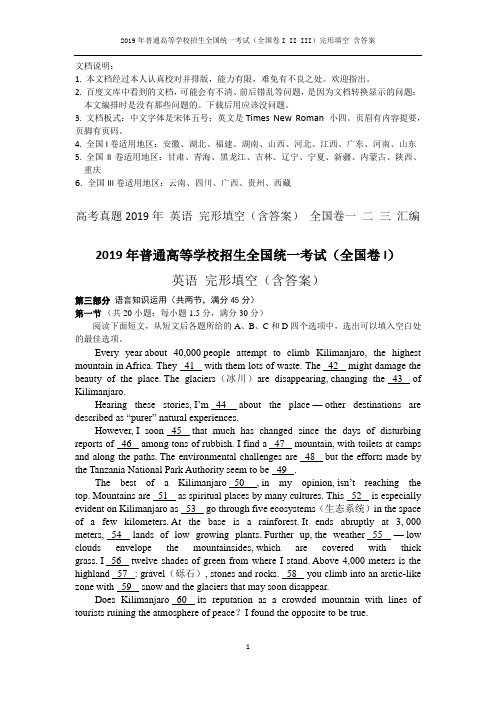
文档说明:1. 本文档经过本人认真校对并排版,能力有限,难免有不良之处。
欢迎指出。
2. 百度文库中看到的文档,可能会有不清、前后错乱等问题,是因为文档转换显示的问题;本文编排时是没有那些问题的。
下载后用应该没问题。
3. 文档板式:中文字体是宋体五号;英文是Times New Roman 小四。
页眉有内容提要,页脚有页码。
4. 全国I卷适用地区:安徽、湖北、福建、湖南、山西、河北、江西、广东、河南、山东5. 全国II卷适用地区:甘肃、青海、黑龙江、吉林、辽宁、宁夏、新疆、内蒙古、陕西、重庆6. 全国III卷适用地区:云南、四川、广西、贵州、西藏高考真题2019年英语完形填空(含答案)全国卷一二三汇编2019年普通高等学校招生全国统一考试(全国卷I)英语完形填空(含答案)第三部分语言知识运用(共两节,满分45分)第一节(共20小题;每小题1.5分,满分30分)阅读下面短文,从短文后各题所给的A、B、C和D四个选项中,选出可以填入空白处的最佳选项。
Every year about 40,000 people attempt to climb Kilimanjaro, the highest mountain in Africa. They 41 with them lots of waste. The 42 might damage the beauty of the place. The glaciers(冰川)are disappearing, changing the 43 of Kilimanjaro.Hearing these stories, I’m 44 about the place — other destinations are described as “purer” natural experiences.However, I soon 45 that much has changed since the days of disturbing reports of 46 among tons of rubbish. I find a 47 mountain, with toilets at camps and along the paths. The environmental challenges are 48 but the efforts made by the Tanzania National Park Authority seem to be 49 .The best of a Kilimanjaro 50 , in my opinion, isn’t reaching the top. Mountains are 51 as spiritual places by many cultures. This 52 is especially evident on Kilimanjaro as 53 go through five ecosystems(生态系统)in the space of a few kilometers. At the base is a rainforest. It ends abruptly at 3, 000 meters, 54 lands of low growing plants. Further up, the weather 55 — low clouds envelope the mountainsides, which are covered with thick grass. I 56 twelve shades of green from where I stand. Above 4,000 meters is the highland 57 : gravel(砾石), stones and rocks. 58 you climb into an arctic-like zone with 59 snow and the glaciers that may soon disappear.Does Kilimanjaro 60 its reputation as a crowded mountain with lines of tourists ruining the atmosphere of peace?I found the opposite to be true.41.A. keep B. mix C. connect D. bring42. A. stories B. buildings C. crowds D. reporters43. A. position B. age C. face D. name44. A. silent B. skeptical C. serious D. crazy45. A. discover B. argue C. decide D. advocate46. A. equipment B. grass C. camps D. stones47. A. remote B. quiet C. all D. clean48. A. new B. special C. significant D. necessary49. A. paying off B. spreading out C. blowing up D. fading away50. A. atmosphere B. experience C. experiment D. sight51. A. studied B. observed C. explored D. regarded52. A. view B. quality C. reason D. purpose53. A. scientists B. climbers C. locals D. officials54. A. holding on to B. going back to C. living up to D. giving way to55. A. changes B. clears C. improves D. permits56. A. match B. imagine C. count D. add57. A. village B. desert C. road D. lake58. A. Obviously B. Easily C. Consequently D. Finally59. A. permanent B. little C. fresh D. artificial60. A. enjoy B. deserve C. save D. acquire2019年普通高等学校招生全国统一考试(全国卷II)英语完形填空(含答案)第三部分语言知识运用(共两节,满分45分)第一节(共20小题;每小题1.5分,满分30分)阅读下面短文,从短文后各题所给的A、B、C和D四个选项中,选出可以填入空白处的最佳选项。
2019年全国普通高等学校招生统一考试英语(全国卷1)-听力部分【含答案及解析】
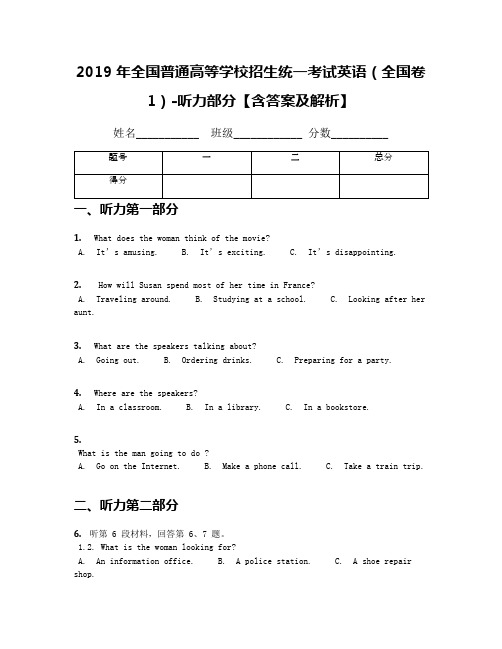
2019年全国普通高等学校招生统一考试英语(全国卷1)-听力部分【含答案及解析】姓名___________ 班级____________ 分数__________一、听力第一部分1. What does the woman think of the movie?A. It’s amusing.B. It’s exciting.C. It’s disappointing.2. How will Susan spend most of her time in France?A. Traveling around.B. Studying at a school.C. Looking after her aunt.3. What are the speakers talking about?A. Going out.B. Ordering drinks.C. Preparing for a party.4. Where are the speakers?A. In a classroom.B. In a library.C. In a bookstore.5.What is the man going to do ?A. Go on the Internet.B. Make a phone call.C. Take a train trip.二、听力第二部分6. 听第 6 段材料,回答第 6、7 题。
1.2. What is the woman looking for?A. An information office.B. A police station.C. A shoe repair shop.3.4. What is the Town Guide according to the man?A. A brochure.B. A newspaper.C. A map.【答案】5.6. C7.8. A【解析】 Text 6W: Excuse me. I wonder if you could tell me how to find a place to have my shoes mended. I’m new in town.M: Ah, there’s a good shop not far from here. Go straight ahead and walk about three blocks. I can’t remember the name of the shop, but you’ll find it. It’s near the police station. By the way, you know about the town guide? It’s a thin book and has all kinds of useful information. You’ll find one in any bookstore.W: Thanks a lot! You’ve been so helpful. Let’s see. Did you say there pair shop was three blocks away from here?M: Exactly.W: Thanks again.9.10. 略11.12. 略【题型】听力第二部分【适用】一般【标题】 2017年全国普通高等学校招生统一考试英语(全国卷1)-听力部分【关键字标签】【结束】听第 7 段材料,回答第 8、9 题。
(完整版)2019年全国高考英语卷1(附答案)

2019年普通高等学校招生全国统一考试(全国卷I)英 语注意事项:1.答卷前,考生务必将自己的姓名、准考证号填写在答题卡上。
2.回答选择题时,选出每小题答案后,用铅笔把答题卡上对应题目的答案标号涂黑。
如需改动,用橡皮擦干净后,再选涂其他答案标号。
回答非选择题时,将答案写在答题卡上,写在本试卷上无效。
3.考试结束后,将本试卷和答题卡一并交回。
第一部分 听力(共两节,满分30分)做题时,先将答案标在试卷上。
录音内容结束后,你将有两分钟的时间将试卷上的答案转涂到答题卡上。
第一节 (共5小题;每小题1.5分,满分7.5分)听下面5段对话。
每段对话后有一个小题,从题中所给的A、B、C三个选项中选出最佳选项。
听完每段对话后,你都有10秒钟的时间来回答有关小题和阅读下一小题。
每段对话仅读一遍。
例:How much is the shirt?A. £19.15.B. £9.18.C. £9.15.答案是C。
1.Where does this conversation take place?A. In a classroom.B. In a hospital.C.In a museum.2.What does Jack want to do?A. Take fitness classes.B. Buy a pair of gym shoes.C. Change his work schedule.3.What are the speakers talking about?A. What to drink.B. Where to meet.C. When to leave.4.What is the relationship between the speakers?A. Colleges.B. Classmates.C. Strangers.5.Why is Emily mentioned in the conversation?A. She might want a ticket.B. She is looking for the man.C. She has an extra ticket.第二节(共15小题,每小题1.5分,满分22.5分)听下面5段对话或独白。
【江苏卷】2019年普通高等学校招生全国统一考试英语真题(Word版,含答案)

绝密★启用前2019年普通高等学校招生全国统一考试(江苏卷)英语(满分:120分钟,考试时间:120分)第一部分听力(共两节,满分20 分)做题时,先将答案标在试卷上。
录音内容结束后,你将有两分钟的时间将试卷上的答案转涂到答题卡上。
第一节(共5小题;每小题1分,满分5分)听下面5段对话。
每段对话后有一个小题,从题中所给的A、B、C三个选项中选出最佳选项。
听完每段对话后,你都有10秒钟的时间来回答有关小题和阅读下一小题。
每段对话仅读一遍。
例:How much is the shirt?A. £ 19.15.B. £ 9.18.C. £ 9.15.答案是C。
1. Where does this conversation take place?A. In a classroom.B. In a hospital.C. In a museum.2. What does Jack want to do?A. Take fitness classes.B. Buy a pair of gym shoes.C. Change his work schedule.3. What are the speakers talking about?A. What to drink.B. Where to meet.C. When to leave.4. What is the relationship between the speakers?A. Colleges.B. Classmates.C. Strangers.5. Why is Emily mentioned in the conversation?A. She might want a ticket.B. She is looking for the man.C. She has an extra ticket.第二节(共15小题;每小题1分,满分15分)听下面5段对话或独白。
2019年普通高等学校招生全国统一考试英语试题(新课标1卷,含解析)
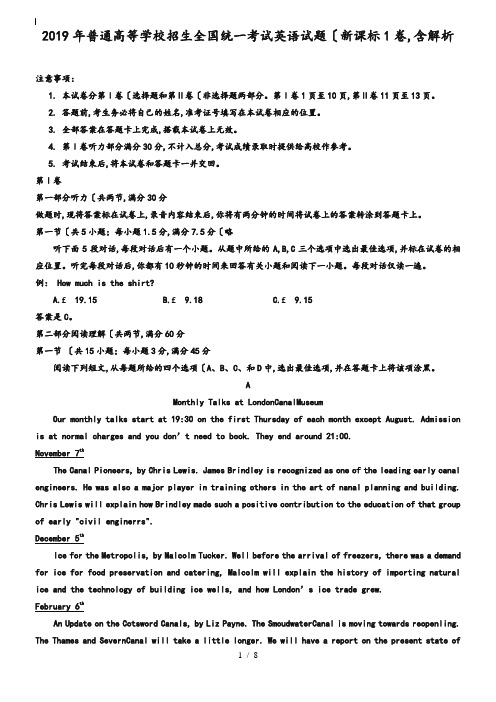
2019年普通高等学校招生全国统一考试英语试题〔新课标1卷,含解析注意事项:1. 本试卷分第Ⅰ卷〔选择题和第Ⅱ卷〔非选择题两部分。
第Ⅰ卷1页至10页,第Ⅱ卷11页至13页。
2. 答题前,考生务必将自己的姓名,准考证号填写在本试卷相应的位置。
3. 全部答案在答题卡上完成,搭载本试卷上无效。
4. 第Ⅰ卷听力部分满分30分,不计入总分,考试成绩录取时提供给高校作参考。
5. 考试结束后,将本试卷和答题卡一并交回。
第Ⅰ卷第一部分听力〔共两节,满分30分做题时,现将答案标在试卷上,录音内容结束后,你将有两分钟的时间将试卷上的答案转涂到答题卡上。
第一节〔共5小题;每小题1.5分,满分7.5分〔略听下面5段对话,每段对话后有一个小题。
从题中所给的A,B,C三个选项中选出最佳选项,并标在试卷的相应位置。
听完每段对话后,你都有10秒钟的时间来回答有关小题和阅读下一小题。
每段对话仅读一遍。
例: How much is the shirt?A.£ 19.15B.£ 9.18C.£ 9.15答案是C。
第二部分阅读理解〔共两节,满分60分第一节〔共15小题;每小题3分,满分45分阅读下列短文,从每题所给的四个选项〔A、B、C、和D中,选出最佳选项,并在答题卡上将该项涂黑。
AMonthly Talks at LondonCanalMuseumOur monthly talks start at 19:30 on the first Thursday of each month except August. Admission is at normal charges and you don’t need to book. They end around 21:00.November 7thThe Canal Pioneers, by Chris Lewis. James Brindley is recognized as one of the leading early canal engineers. He was also a major player in training others in the art of nanal planning and building. Chris Lewis will explain how Brindley made such a positive contribution to the education of that group of early "civil enginerrs".December 5thIce for the Metropolis, by Malcolm Tucker. Well before the arrival of freezers, there was a demand for ice for food preservation and catering, Malcolm will explain the history of importing natural ice and the technology of building ice wells, and how London’s ice trade grew.February 6thAn Update on the Cotsword Canals, by Liz Payne. The SmoudwaterCanal is moving towards reopenling. The Thames and SevernCanal will take a little longer. We will have a report on the present state ofplay.March 6thEyots and Aits-ThamesIslands, by Miranda Vickers. The Thames had many islands. Miranda has undertaken a review of all of them. She will tell us about those of greatest interest.Online bookings:More into:LondonCanalMuseum12-13 New Wharf Road, London NI 9RTTel:020 ********21.When is the talk on James Brindley?A. February 6th.B. March 6th.C. November 7th.D. December 5th.22. What is the topic of the talk in February?A. The Canal Pioneers.B. Ice for the MetropolisC. Eyots and Aits-ThamesIslandsD. An Update on the Cotsword Canals23. Who will give the talk on the islands in the Thames.A. Miranda VickersB. Malcolm TuckerC. Chris LewisD. Liz PayneBThe freezing Northeast hasn’t been a terribly fun place to spend time this winter, so when the chance came for a weekend to Sarasota, Florida, my bags were packed before you could say "sunshine".I left for the land of warmth and vitamin C<维生素C>, thinking of beaches and orange trees. When we touched down to blue skies and warm air, I sent up a small prayer of gratefulness. Swimming pools, wine tasting, and pink sunsets<at normal evening hours, not 4 in the afternoon> filled the weekend, but the best part- particularly to my taste, dulled by months of cold- weather root vegetables- was a 7 a.m. adventure to the Sarasota farmers’ market that proved to be more than worth the early wake-up call.The market, which was founded in 1979, sets up its tents every Saturday from 7:00 am to 1 p.m, rain or shine, along North Lemon and State streets. Baskets of perfect red strawberries, the red-painted sides of the Java Dawg coffee truck; and most of all, the tomatoes: amazing, large, soft and round red tomatoes.Disappointed by many a broken, vine-ripened<蔓上成熟的> promise, I’ve refused to buy winter tomatoes for years. N o matter how attractive they look in the store, once I get them home they’re unfailingly dry, hard, and tasteless. But I homed in, with uncertainty, on one particular table at the Brown’s Grove Farm’s stand, full of fresh and soft tomatoes the size of my f ist. These were the real deal- and at that moment, I realized that the best part of Sarasota in winter was going to be eating things that back home in New York I wouldn’t be experiencing again for months.Delighted as I was by the tomatoes in sight, my ha ppiness deepened when I learned that Brown’s Grove Farm is one of the suppliers for Jack Dusty, a newly opened restaurant at the Sarasota Ritz Carlton, where- luckily for me- I was planning to have dinner that very night. Without even seeing the menu, I kn ew I’d be ordering every tomato on it.24. What did the author think of her winter life in New York?A. Exciting.B. Boring.C. Relaxing.D. Annoying.25. What made the author’s getting up late early worthwhile?A. Having a swim.B. Breathing in fresh air.C. Walking in the morning sun.D. Visiting a local farmer’s market.26. What can we learn about tomatoes sold in New York in winter?A. They are soft.B. They look nice.C. They taste great.D. They are juicy.27. What was the author going to that evening?A. Go to a farm.B. Check into a hotel.C. Eat in a restaurant.D. Buy fresh vegatables.CSalvador Dali <1904-1989> was one of the most popular of modern artists. The Pompidou Centre in Paris is showing its respect and admiration for the artist and his powerful personality with an exhibition bringing together over 200 paintings, sculptures, drawings and more. Among the works and masterworks on exhibition the visitor will find the best pieces, most importantly The Persistence of Memory. There is a lso L’Enigme sans Fin from 1938, works on paper, objects, and projects for stage and screen and selected parts from television programmes reflecting the artist’s showman qualities.The visitor will enter the World of Dali through an egg and is met with the beginning, the world of birth. The exhibition follows a path of time and subject with the visitor exiting through the brain.The exhibition shows how Dali draws the viewer between two infinities <无限>. "From the infinitysmall to the infinity large, contraction and expansion coming in and out of focus: amazing Flemish accuracy and the showy Baroque of old painting that he used in his museum-theatre in Figueras," explains the Pompidou Centre.The fine selection of the major works was done in close collaboration <合作>with the Museo Nacional Reina Sofia in Madrid, Spain, and with contributions from other institutions like the Salvador Dali Museum in St. Petersburg.28. Which of the following best describe Dali according to Paragraph 1?A. Optimistic.B. ProductiveC. Generous.D. Traditional.29. What is Dali’s The Persistence of Memory considered to be?A. One of his masterworks.B. A successful screen adaptation.C. An artistic creation for the stage.D. One of the beat TV programmes.30. How are the exhibits arranged at the World of Dali?A. By popularity.B. By importance.C. By size and shape.D. By time and subject.31. What does the word "contributions" in the last paragraph refer to?A. Artworks.B. Projects.C. Donations.D. Documents.DConflict is on the menu tonight at the café La Chope. This evening, as on every Thursday night, psychologist Maud Lehanne is leading two of France’s favorite pastimes, coffee drinking and the "talking cure". Here they are l earning to get in touch with their true feelings. It isn’t always easy. They customers-some thirty Parisians who pay just under $2 <plus drinks> per session-care quick to intellectualize <高谈阔论>,slow to open up and connect. "You are forbidden to say ‘one feels,’ or ‘people think’,"Lehane told them. "Say ‘I think,’ ‘Think me’."A café society where no intellectualizing is allowed? It couldn’t seem more un-French. But Lehanne’s psychology café is about more than knowing oneself: It’s trying to help the city’s troubled neighborhood cafes. Over the years, Parisian cafes have fallen victim to changes in the French lifestyle-longer working hours, a fast food boom and a younger generation’s desire to spend more time at home. Dozens of new theme cafes appear to change the situation. Cafes focused around psychology, history, and engineering are catching on, filling tables well into the evening.32.What are people encouraged to do at the cafe La Chope?A. Learn a new subjectB. Keep in touch with friends.C. Show off their knowledge.D. Express their true feelings.33. How are cafes affected by French lifestyle changes?A. They are less frequently visited.B. They stay open for longer hours.C. They have bigger night crowds.D. They start to serve fast food.34. What are theme cafes expected to do?A. Create more jobs.B. Supply better drinks.C. Save the cafe business.D. Serve the neighborhood.35. Why are psychology cafes becoming popular in Paris?A. They bring people true friendship.B. They give people spiritual support.C. They help people realize their dreams.D. They offer a platform for business links.D篇.文章大意:文章主要讲述了精神咖啡馆在法国越来越受欢迎。
【高考试卷】2019年普通高等学校招生全国统一考试英语(上海卷)及答案》
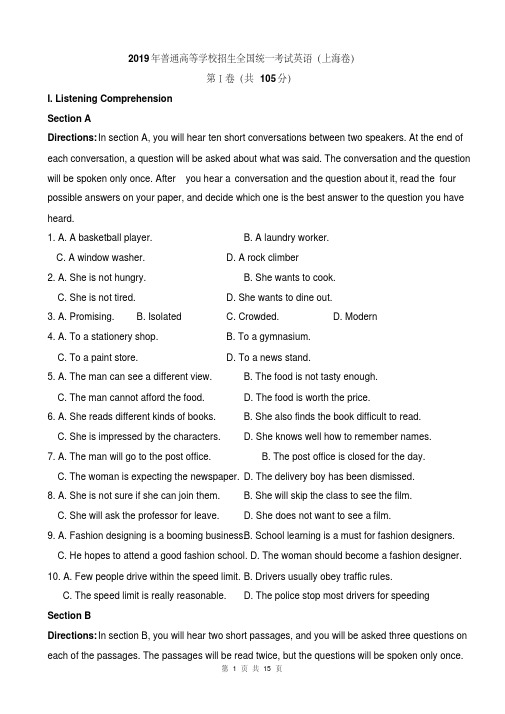
2019年普通高等学校招生全国统一考试英语(上海卷)第Ⅰ卷(共105分)I. Listening ComprehensionSection ADirections: In section A, you will hear ten short conversations between two speakers. At the end of each conversation, a question will be asked about what was said. The conversation and the question will be spoken only once. After you hear a conversation and the question about it, read the four possible answers on your paper, and decide which one is the best answer to the question you have heard.1. A. A basketball player. B. A laundry worker.C. A window washer.D. A rock climber2. A. She is not hungry. B. She wants to cook.C. She is not tired.D. She wants to dine out.3. A. Promising. B. Isolated C. Crowded. D. Modern4. A. To a stationery shop. B. To a gymnasium.C. To a paint store.D. To a news stand.5. A. The man can see a different view. B. The food is not tasty enough.C. The man cannot afford the food.D. The food is worth the price.6. A. She reads different kinds of books. B. She also finds the book difficult to read.C. She is impressed by the characters.D. She knows well how to remember names.7. A. The man will go to the post office. B. The post office is closed for the day.C. The woman is expecting the newspaper.D. The delivery boy has been dismissed.8. A. She is not sure if she can join them. B. She will skip the class to see the film.C. She will ask the professor for leave.D. She does not want to see a film.9. A. Fashion designing is a booming business. B. School learning is a must for fashion designers.C. He hopes to attend a good fashion school.D. The woman should become a fashion designer.10. A. Few people drive within the speed limit. B. Drivers usually obey traffic rules.C. The speed limit is really reasonable.D. The police stop most drivers for speedingSection BDirections: In section B, you will hear two short passages, and you will be asked three questions on each of the passages. The passages will be read twice, but the questions will be spoken only once.When you hear a question, read the four possible answers on your paper, and decide which one would be the best answer to the question you have heard.Questions 11 through 13 are based on the following passage.11. A. A book publisher. B. A company manager.C. A magazine editor.D. A school principal.12. A. Some training experience. B. A happy family.C. Russian assistants' help.D. A good memory.13. A. Lynn’s devotion to the family. B. Lynn’s busy and successful life.C. Lynn’s great performance at work.D. Lynn’s efficiency in conducting programs. Questions 14 through 16 are based on the following passage.14. A. Economic questions. B. Routine questions.C. Academic questions.D. Challenging questions.15. A. Work experience. B. Educational qualifications.C. Problem-solving abilities.D. Information-gathering abilities.16. A. Features of different types of interview. B. Skills in asking interview questions.C. Changes in three interview models.D. Suggestions for different job interviews. Section CDirections: In section C, you will hear two longer conversations. The conversations will be read twice. After you hear each conversation, you are required to fill in the numbered blanks with the information you have heard. Write your answers on your answer sheet.Blanks 17 through 20 are based on the following conversation.Complete the form. Write ONE WORD for each answer.Latest Conference InformationDate: 8th 17Place: Palace 18 , ShanghaiRegistration fee: $ 19Speaker: Carla Marisco from Milan UniversitySpeech topic: Opportunities and Risks in the 20 MarketBlanks 21 through 24 are based on the following conversation.Complete the form. Write NO MORE THAN THREE WORDS for each answer.An Interview with David, a Skateboarding (滑板运动) LoverWhat was David's schoolwork like? He was able to get his schoolwork done 21 .What was his only problem atschool?He was unable to 22 in class.Why did he say the newheadmaster was wonderful?He let students 23 of their own.How was his new style differentfrom other skaters?It was robot-like, with 24 .II. Grammar and VocabularySection ADirections: Beneath each of the following sentences there are four choices marked A, B, C and D. Choose the one answer that best completes the sentence.25. —I’m looking for a nearby place for my holiday. Any good ideas?— How about the Moon Lake? It is ________ easy reach of the city.A. byB. beyondC. withinD. from26. Those who smoke heavily should remind ________ of health, the bad smell and the feelings ofotherpeople.A. theirsB. themC. themselvesD. oneself27. Bob called to tell his mother that he couldn’t enter the house, for he ________ his key at school.A. had leftB. would leaveC. was leavingD. has left28. It’s a ________ clock, made of brass and dating from the nineteenth century.A. charming French smallB. French small charmingC. small French charmingD. charming small French29. The school board is made up of parents who ________ to make decisions about school affairs.A. had been electedB. had electedC. have been electedD. have elected30. They promised to develop a software package b y the end of this year, ________ they mighthave.A. however difficultB. how difficultC. whatever difficultyD. what difficulty31. The judges gave no hint of what they thought, so I left the room really ________.A. to be worriedB. to worryC. having worriedD. worried32. The students are looking forward to having an opportunity ________ society for real-life experience.A. exploreB. to exploreC. exploringD. explored33. I have no idea ________ the cell phone isn’t working, so could you fix it for me?A. whatB. whyC. ifD. which34. Young people may risk ________ deaf if they are exposed to very loud music every day.A. to goB. to have goneC. goingD. having gone35. Sophia got an e-mail ________ her credit card account number.A. asking forB. ask forC. asked forD. having asked for36. I cannot hear the professor clearly as there is too much noise ________ I am sitting.A. beforeB. untilC. unlessD. where37. ________ at the photos, illustrations, title and headings and you can guess what the reading is about.A. To lookB. LookingC. Having lookedD. Look38. An ecosystem consists of the living and nonliving things in an area ________ interact with one another.A. thatB. whereC. whoD. what39. Among the crises that face humans ________ the lack of natural resources.A. isB. areC. is thereD. are there40. Some people care much about their appearance and always ask if they look fine in ________ they arewearing.A. thatB. whatC. howD. whichSection BDirections: Complete the following passage by using the words in the box. Each word can only be used once. Note that there is one word more than you need.A. restoreB. recallC. processingD. previouslyE. necessaryF. locatingG. insteadH. fascinatingI. elsewhereJ.As infants, we can recognize our mothers within hours of birth. In fact, we can recognize the41 of our mother’s face well before we can recognize her body shape. It’s42 how the brain cancarry out such a function at such a young age, especially since we don’t learn to walk an we are over a year old. By the time we are adults, we have the ability to distinguish around 100,000faces. How can we remember so many faces when many of us find it difficult to 43 such asimple thing as a phone number? The exact process is not yet fully understood, but research aroundthe world has begun to define the specific areas of the brain and processes 44 for facial recognition.Researchers at the Massachusetts Institute of Technology believe that they have succeeded in45 a specific area of the brain called the fusiform face area (FFA), which is used only for facial recognition. This means that recognition of familiar objects such as our clothes or cars, is from 46in the brain. Researchers also have found that the brain needs to see the whole face for recognitionto take place. It had been 47 thought that we only needed to see certain facial features. Meanwhile, research at University College London has found that facial recognition is not a single process, but 48 involves three steps. The first step appears to be an analysis of the physicalfeatures of a person’s face, which is similar to how we scan the bar codes of our groceries. In the next step, the brain decides whether the face we are looking at is already known or unknown to us.And finally, the brain furnishes the information we have collected about the person whose face weare looking at. This complex 49 is done in a split second so that we can behave quickly whenreacting to certain situations.III. Reading ComprehensionSection ADirections: For each blank in the following passage there are four words or phrases marked A, B, Cand D. Fill in each blank with the word or phrase that best fits the context.Over the past few decades, more and more countries have opened up the markets, increasingly transforming the world economy into one free-flowing global market. The question is:Is economic globalization 50 for all?According to the World Bank, one of its chief supporters, economic globalization has helpedreduce 51 in a large number of developing countries. It quotes one study that shows increasedwealth 52 to improved education and longer life in twenty-four developing countries as a resultof integration (融合) of local economies into the world economy. Home to some three billionpeople, these twenty-four countries have seen incomes 53 at an average rate of fivepercent—compared to two percent in developed countries.Those who 54 globalization claim that economies in developing countries will benefit from new opportunities for small and home-based businesses. 55 , small farmers in Brazil who produce nuts that would originally have sold only in 56 open-air markets can now promote their goods worldwide by the Internet.Critics take a different view, believing that economic globalization is actually 57 the gap between the rich and poor. A study carried out by the U.N.-sponsored World Commission on the Social Dimension of Globalization shows that only a few developing countries have actually 58 from integration into the world economy and that the poor, the uneducated, unskilled workers, and native peoples have been left behind. 59 , they maintain that globalization may eventually threaten emerging businesses. For example, Indian craftsmen who currently seem to benefit from globalization because they are able to 60 their products may soon face fierce competition that could pot them out of 61 . When large-scale manufacturers start to produce the same goods, or when superstores like Wal-Mart move in, these small businesses will not be able to 62 and will be crowded out.One thing is certain about globalization—there is no 63 . Advances in technology combined with more open policies have already created an interconnected world. The 64 now is finding a way to create a kind of globalization that works for the benefit of all.50. A. possible B. smooth C. good D. easy51. A. crime B. poverty C. conflict D. population52. A. contributing B. responding C. turning D. owing53. A. remain B. drop C. shift D. increase54. A. doubt B. define C. advocate D. ignore55. A. In addition B. For instance C. In other words D. All in all56. A. mature B. new C. local D. foreign57. A. finding B. exploring C. bridging D. widening58. A. suffered B. profited C. learned D. withdrawn59. A. Furthermore B. Therefore C. However D. Otherwise60. A. consume B. deliver C. export D. advertise61. A. trouble B. business C. power D. mind62. A. keep up B. come in C. go around D. help out63. A. taking off B. getting along C. holding out D. turning back64. A. agreement B. prediction C. outcome D. challengeSection BDirections: Read the following three passages. Each passage is followed by several questions or unfinished statements. For each of them there are four choices marked A, B, C and D. Choose theone that fits best according to the information given in the passage you have just read.AFor some people, music is no fun at all. About four percent of the population is what scientistscall “amusic.” People who are amusic are born without the ability to recognize or reproduce musical notes (音调). Amusic people often cannot tell the difference between two songs. Amusics can onlyhear the difference between two notes if they are very far apart on the musical scale.As a result, songs sound like noise to an amusic. Many amusics compare the sound of music topieces of metal hitting each other. Life can be hard for amusics. Their inability to enjoy music setthem apart from others. It can be difficult for other people to identify with their condition. In fact,most people cannot begin to grasp what it feels like to be amusic. Just going to a restaurant or ashopping mall can be uncomfortable or even painful. That is why many amusics intentionally stayaway from places where there is music. However, this can result in withdrawal and social isolation.“I used to hate parties,” says Margaret, a seventy-year-old woman who only recently discoveredthat she was amusic. By studying people like Margaret, scientists are finally learning how toidentify this unusual condition.Scientists say that the brains of amusics are different from the brains of people who candefective hearing. Amusics can appreciate music. The difference is complex, and it doesn’t involveunderstand other nonmusical sounds well. They also have no problems understanding ordinaryspeech. Scientist s compare amusics to people who just can’t see certain colors.Many amusics are happy when their condition is finally diagnosed (诊断). For years, Margaretfelt embarrassed about her problem with music. Now she knows that she is not alone. There is aname for her condition. That makes it easier for her to explain. “When people invite me t I just say, ‘No thanks, I’m amusic,’” says Margaret. “I just wish I had learned to say tha seventeen and not seventy.” 65. Which of the following is true of amusics?A. Listening to music is far from enjoyable for them.B. They love places where they are likely to hear music.C. They can easily tell two different songs apart.D. Their situation is well understood by musicians.66. According to paragraph 3, a person with “defective hearing ” is probably one who __________.A. dislikes listening to speechesB. can hear anything nonmusicalC. has a hearing problemD. lacks a complex hearing system67. In the last paragraph, Margaret expressed her wish that __________.A. her problem with music had been diagnosed earlierB. she were seventeen years old rather than seventyC. her problem could be easily explainedD. she were able to meet other amusics68. What is the passage mainly concerned with?A. Amusics ’ strange behaviours.B. Some people ’s inability to enjoy music.C. Musical talent and brain structure.D. Identification and treatment of amusics. B69. According to Warranty Limitations , a product can be under warranty if __________. A. shipped from a Canadian factoryB. rented for home useC. repaired by the user himselfD. used in the U.S.A. 70. According to Owner ’s Responsibilities , an owner has to pay for __________.A. the loss of the sales receiptB. a servicer ’s ov ertime work Home Laundry Automatic Dryer ProductFull Two Year Warranty (保修)Limited Five Year Warranty on Cabinet (机箱)Warranty Provides for :FIRST TWO YEARS Amana will repair or replace any faulty part free of charge.THIRD THRU FIFTH YEARS Amana will provide a free replacement part for any cabinet whichproves faulty due to rust (生锈)。
2019年普通高等学校招生全国统一考试 (全国1卷)-含答案和听力原文

绝密★启封前2019年普通⾼等学校招⽣全国统⼀考试(全国卷1)英语注意事项:1.答卷前,考⽣务必将⾃⼰的姓名、准考证号填写在答题卡上。
2.回答选择题时,选出每⼩题答案后,⽤铅笔把答题卡上对应题⽬的答案标号涂⿊。
如需改动,⽤橡⽪擦⼲净后,再选涂其他答案标号。
回答⾮选择题时,将答案写在答题卡上,写在本试卷上⽆效。
3.考试结束后,将本试卷和答题卡⼀并交回。
第⼀部分听⼒(共两节,满分30分)做题时,先将答案标在试卷上。
录⾳内容结束后,你将有两分钟的时间将试卷上的答案转涂到答题卡上。
第⼀节(共5⼩题;每⼩题1.5分,满分7.5分)听下⾯5段对话。
每段对话后有⼀个⼩题,从题中所给的A、B、C三个选项中选出最佳选项。
听完每段对话后,你都有10秒钟的时间来回答有关⼩题和阅读下⼀⼩题。
每段对话仅读⼀遍。
例:How much is the shirt?A. £19.15.B. £9.18.C. £9.15.答案是C。
1. Where does this conversation take place?A. In a classroom.B. In a hospital.C. In a museum.2. What does Jack want to do?A. Take fitness classes.B. Buy a pair of gym shoes.C. Change his work schedule.3. What are the speakers talking about?A. What to drink.B. Where to meet.C. When to leave.4. What is the relationship between the speakers?A. Colleges.B. Classmates.C. Strangers.5. Why is Emily mentioned in the conversation?A. She might want a ticket.B. She is looking for the man.C. She has an extra ticket.第⼆节(共15⼩题,每⼩题1.5分,满分22.5分)听下⾯5段对话或独⽩。
(完整word)【作文范文】全国I卷2019年高考英语真题卷
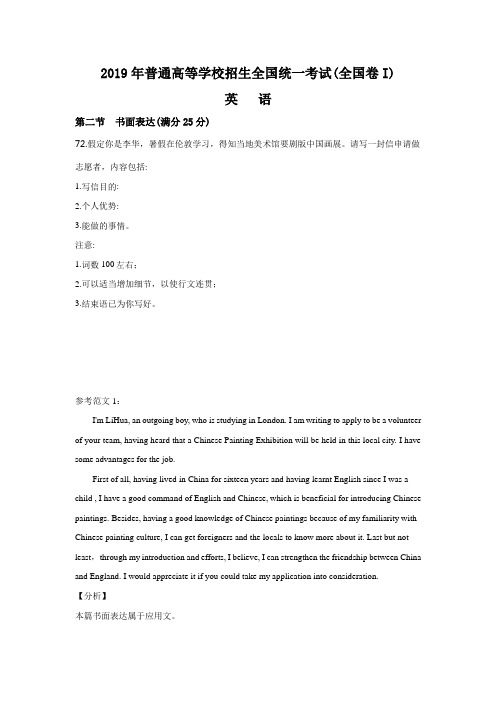
2019年普通高等学校招生全国统一考试(全国卷I)英语第二节书面表达(满分25分)72.假定你是李华,暑假在伦敦学习,得知当地美术馆要剧版中国画展。
请写一封信申请做志愿者,内容包括:1.写信目的:2.个人优势:3.能做的事情。
注意:1.词数100左右;2.可以适当增加细节,以使行文连贯;3.结束语已为你写好。
_______________________________________________________________________________ _______________________________________________________________________________ _______________________________________________________________________________ __________________________________________________________________参考范文1:I'm LiHua, an outgoing boy, who is studying in London. I am writing to apply to be a volunteer of your team, having heard that a Chinese Painting Exhibition will be held in this local city. I have some advantages for the job.First of all, having lived in China for sixteen years and having learnt English since I was a child , I have a good command of English and Chinese, which is beneficial for introducing Chinese paintings. Besides, having a good knowledge of Chinese paintings because of my familiarity with Chinese painting culture, I can get foreigners and the locals to know more about it. Last but not least,through my introduction and efforts, I believe, I can strengthen the friendship between China and England. I would appreciate it if you could take my application into consideration.【分析】本篇书面表达属于应用文。
2019年普通高等学校招生全国统一考试英语试题(全国新课标Ⅰ卷)-含答案
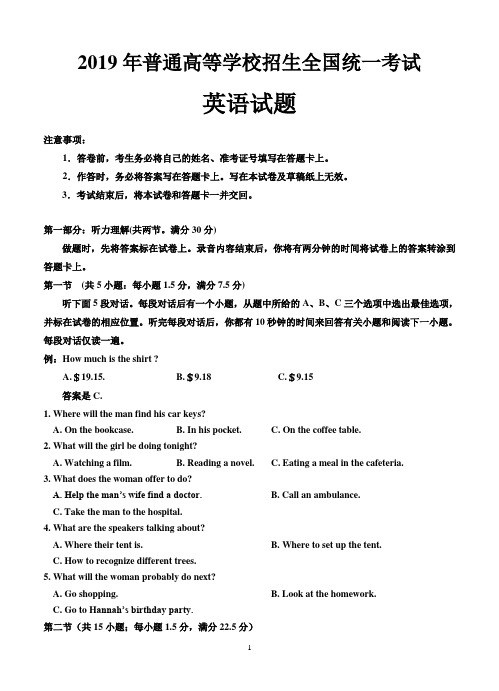
2019年普通高等学校招生全国统一考试英语试题注意事项:1.答卷前,考生务必将自己的姓名、准考证号填写在答题卡上。
2.作答时,务必将答案写在答题卡上。
写在本试卷及草稿纸上无效。
3.考试结束后,将本试卷和答题卡一并交回。
第一部分:听力理解(共两节。
满分30分)做题时,先将答案标在试卷上。
录音内容结束后,你将有两分钟的时间将试卷上的答案转涂到答题卡上。
第一节(共5小题:每小题1.5分,满分7.5分)听下面5段对话。
每段对话后有一个小题,从题中所给的A、B、C三个选项中选出最佳选项,并标在试卷的相应位置。
听完每段对话后,你都有10秒钟的时间来回答有关小题和阅读下一小题。
每段对话仅读一遍。
例:How much is the shirt ?A.$19.15.B.$9.18C.$9.15答案是C.1. Where will the man find his car keys?A. On the bookcase.B. In his pocket.C. On the coffee table.2. What will the girl be doing tonight?A. Watching a film.B. Reading a novel.C. Eating a meal in the cafeteria.3. What does the woman offer to do?A. Help the man’s wife find a doctor.B. Call an ambulance.C. Take the man to the hospital.4. What are the speakers talking about?A. Where their tent is.B. Where to set up the tent.C. How to recognize different trees.5. What will the woman probably do next?A. Go shopping.B. Look at the homework.C. Go to H annah’s birthday party.第二节(共15小题;每小题1.5分,满分22.5分)听下面5段对话或独白。
2019年全国统一高考英语试卷(新课标Ⅰ)(含答案)

2019年普通高等学校招生全国统一考试(全国卷I)英语注意事项:1.答卷前,考生务必将自己的姓名、准考证号填写在答题卡上。
2.回答选择题时,选出每小题答案后,用铅笔把答题卡上对应题目的答案标号涂黑。
如需改动,用橡皮擦干净后,再选涂其他答案标号。
回答非选择题时,将答案写在答题卡上,写在本试卷上无效。
3.考试结束后,将本试卷和答题卡一并交回。
第一部分听力(共两节,满分30分)做题时,先将答案标在试卷上。
录音内容结束后,你将有两分钟的时间将试卷上的答案转涂到答题卡上。
第一节 (共5小题;每小题1.5分,满分7.5分)听下面5段对话。
每段对话后有一个小题,从题中所给的A、B、C三个选项中选出最佳选项。
听完每段对话后,你都有10秒钟的时间来回答有关小题和阅读下一小题。
每段对话仅读一遍。
例:How much is the shirt?A. £19.15.B. £9.18.C. £9.15.答案是C。
1.Where does this conversation take place?A. In a classroom.B. In a hospital.C. In a museum. 【答案】B2.What does Jack want to do?A. Take fitness classes.B. Buy a pair of gym shoes.C. Change his work schedule.【答案】A3.What are the speakers talking about?A. What to drink.B. Where to meet.C. When to leave. 【答案】B4.What is the relationship between the speakers?A. Colleges.B. Classmates.C. Strangers.【答案】C5.Why is Emily mentioned in the conversation?A. She might want a ticket.B. She is looking for the man.C. She has an extra ticket.【答案】A第二节(共15小题,每小题1.5分,满分22.5分)听下面5段对话或独白。
2019年高考英语全国卷1(附参考答案及详解)
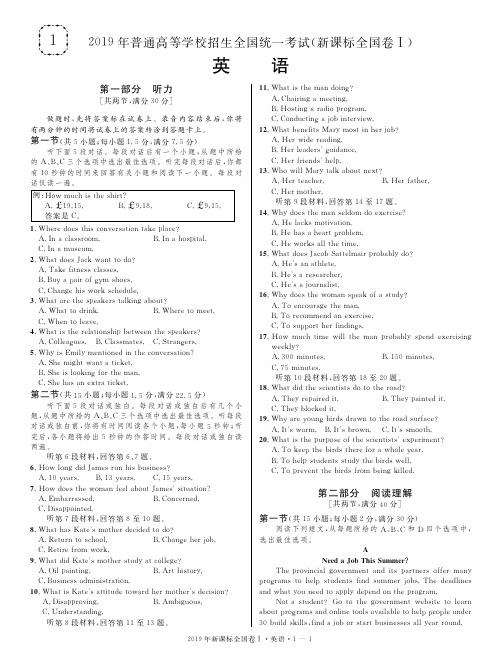
题从题中所给的 )*+ 三个选项中选出最佳选项听每段
对话或独白前你将 有 时 间 阅 读 各 个 小 题每 小 题 & 秒 钟听
完后各小题将给出 & 秒 钟 的 作 答 时 间 每 段 对 话 或 独 白 读
两遍
听 第 L 段 材 料 &回 答 第 L,( 题 +
&',-.A-<G;3;C>/6470<234H043<644*
)'B576\03764<-57>3<3<GH6E-766/@A-F/6<5' *'B5@7-=3;64>.>7;4E-770<<3<G<6.H043<64464' +'B5>AA-.4-<65-.-7?3<526<>507>A6<=37-</6<5'
N'B5-EE674/-7640//67Q-H-@@-750<35364' ""':2>534526>G67><G676\0376; HF I56.>7;423@ X-052
!':2676;-6452341-<=674>53-<5>?6@A>16*
)'B<>1A>447--/'
*'B<>2-4@35>A'
+'B<>/0460/'
"':2>5;-64C>1?.><55-;-*
2019年普通高等学校招生全国统一考试全国卷I英语试题含答案
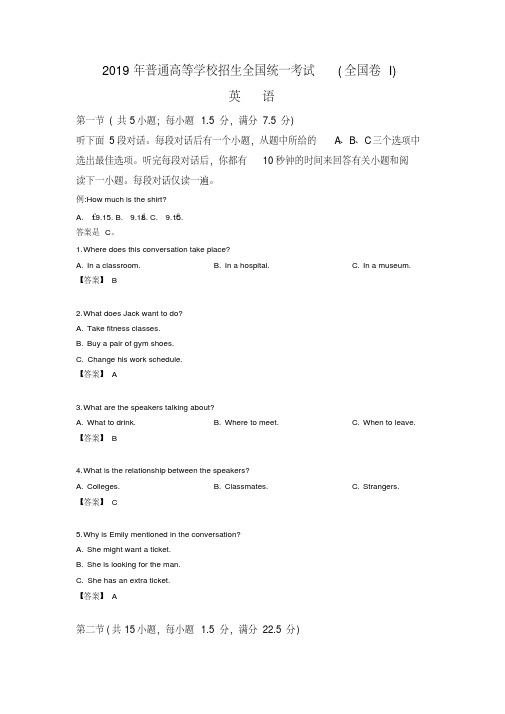
2019年普通高等学校招生全国统一考试(全国卷I)英语第一节 (共5小题;每小题 1.5分,满分7.5分)听下面5段对话。
每段对话后有一个小题,从题中所给的A、B、C三个选项中选出最佳选项。
听完每段对话后,你都有10秒钟的时间来回答有关小题和阅读下一小题。
每段对话仅读一遍。
例:How much is the shirt?9.15.A. £19.15.B. £9.18. C. £答案是C。
1.Where does this conversation take place?A. In a classroom.B. In a hospital.C. In a museum. 【答案】B2.What does Jack want to do?A. Take fitness classes.B. Buy a pair of gym shoes.C. Change his work schedule.【答案】A3.What are the speakers talking about?A. What to drink.B. Where to meet.C. When to leave. 【答案】B4.What is the relationship between the speakers?A. Colleges.B. Classmates.C. Strangers. 【答案】C5.Why is Emily mentioned in the conversation?A. She might want a ticket.B. She is looking for the man.C. She has an extra ticket.【答案】A第二节(共15小题,每小题 1.5分,满分22.5分)听下面5段对话或独白。
每段对话或独白后有几个小题,从题中所给的A、B、C三个选项中选出最佳选项。
听每段对话或独白前,你将有时间阅读各个小题,每小题5秒钟;听完后,各小题将给出5秒钟的作答时间。
2019年全国英语卷1-听力-(试题+原文+答案)
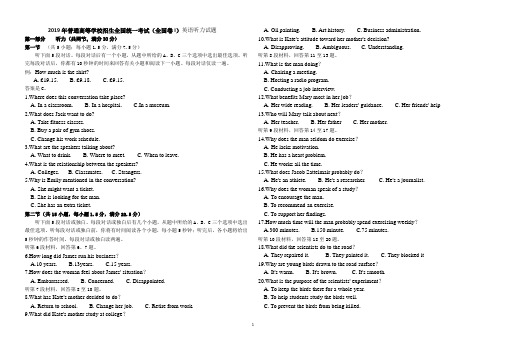
2019年普通高等学校招生全国统一考试(全国卷I)英语听力试题第一部分听力(共两节,满分30分)第一节(共5小题;每小题1.5分,满分7.5分)听下面5段对话。
每段对话后有一个小题,从题中所给的A、B、C三个选项中选出最佳选项。
听完每段对话后,你都有10秒钟的时间来回答有关小题和阅读下一小题。
每段对话仅读一遍。
例:How much is the shirt?A. £19.15.B. £9.18.C. £9.15.答案是C。
1.Where does this conversation take place?A. In a classroom.B. In a hospital.C.In a museum.2.What does Jack want to do?A. Take fitness classes.B. Buy a pair of gym shoes.C. Change his work schedule.3.What are the speakers talking about?A. What to drink.B. Where to meet.C. When to leave.4.What is the relationship between the speakers?A. Colleges.B. Classmates.C. Strangers.5.Why is Emily mentioned in the conversation?A. She might want a ticket.B. She is looking for the man.C. She has an extra ticket.第二节(共15小题,每小题1.5分,满分22.5分)听下面5段对话或独白。
每段对话或独白后有几个小题,从题中所给的A、B、C三个选项中选出最佳选项。
听每段对话或独白前,你将有时间阅读各个小题,每小题5秒钟;听完后,各小题将给出5秒钟的作答时间。
2019年全国一卷英语高考真题及答案解析
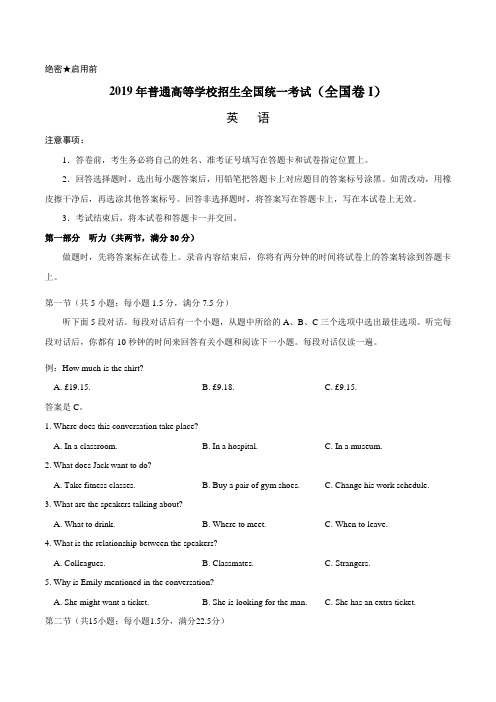
绝密★启用前2019年普通高等学校招生全国统一考试(全国卷I)英语注意事项:1.答卷前,考生务必将自己的姓名、准考证号填写在答题卡和试卷指定位置上。
2.回答选择题时,选出每小题答案后,用铅笔把答题卡上对应题目的答案标号涂黑。
如需改动,用橡皮擦干净后,再选涂其他答案标号。
回答非选择题时,将答案写在答题卡上,写在本试卷上无效。
3.考试结束后,将本试卷和答题卡一并交回。
第一部分听力(共两节,满分30分)做题时,先将答案标在试卷上。
录音内容结束后,你将有两分钟的时间将试卷上的答案转涂到答题卡上。
第一节(共5小题;每小题1.5分,满分7.5分)听下面5段对话。
每段对话后有一个小题,从题中所给的A、B、C三个选项中选出最佳选项。
听完每段对话后,你都有10秒钟的时间来回答有关小题和阅读下一小题。
每段对话仅读一遍。
例:How much is the shirt?A. £19.15.B. £9.18.C. £9.15.答案是C。
1. Where does this conversation take place?A. In a classroom.B. In a hospital.C. In a museum.2. What does Jack want to do?A. Take fitness classes.B. Buy a pair of gym shoes.C. Change his work schedule.3. What are the speakers talking about?A. What to drink.B. Where to meet.C. When to leave.4. What is the relationship between the speakers?A. Colleagues.B. Classmates.C. Strangers.5. Why is Emily mentioned in the conversation?A. She might want a ticket.B. She is looking for the man.C. She has an extra ticket.第二节(共15小题;每小题1.5分,满分22.5分)听下面5段对话或独白。
2019年高考英语真题(全国卷I)含答案
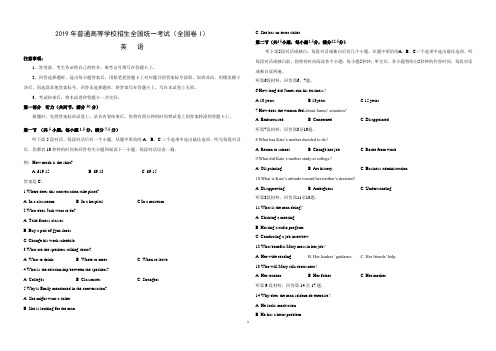
2019年普通高等学校招生全国统一考试(全国卷I)英语注意事项:1.答卷前,考生务必将自己的姓名、准考证号填写在答题卡上。
2.回答选择题时,选出每小题答案后,用铅笔把答题卡上对应题目的答案标号涂黑。
如需改动,用橡皮擦干净后,再选涂其他答案标号。
回答非选择题时,将答案写在答题卡上,写在本试卷上无效。
3.考试结束后,将本试卷和答题卡一并交回。
第一部分听力(共两节,满分30分)做题时,先将答案标在试卷上。
录音内容结束后,你将有两分钟的时间将试卷上的答案转涂到答题卡上。
第一节(共5小题;每小题1.5分,满分7.5分)听下面5段对话。
每段对话后有一个小题,从题中所给的A、B、C三个选项中选出最佳选项。
听完每段对话后,你都有10秒钟的时间来回答有关小题和阅读下一小题。
每段对话仅读一遍。
例:How much is the shirt?A. £19.15.B. £9.18.C. £9.15.答案是C。
1.Where does this conversation take place?A. In a classroom.B. In a hospital.C.In a museum.2.What does Jack want to do?A. Take fitness classes.B. Buy a pair of gym shoes.C. Change his work schedule.3.What are the speakers talking about?A. What to drink.B. Where to meet.C. When to leave.4.What is the relationship between the speakers?A. Colleges.B. Classmates.C. Strangers.5.Why is Emily mentioned in the conversation?A. She might want a ticket.B. She is looking for the man.C. She has an extra ticket.第二节(共15小题,每小题1.5分,满分22.5分)听下面5段对话或独白。
- 1、下载文档前请自行甄别文档内容的完整性,平台不提供额外的编辑、内容补充、找答案等附加服务。
- 2、"仅部分预览"的文档,不可在线预览部分如存在完整性等问题,可反馈申请退款(可完整预览的文档不适用该条件!)。
- 3、如文档侵犯您的权益,请联系客服反馈,我们会尽快为您处理(人工客服工作时间:9:00-18:30)。
2019年普通高等学校招生全国统一考试(全国卷I)英语注意事项:1.答卷前,考生务必将自己的姓名、准考证号填写在答题卡和试卷指定位置上。
2.回答选择题时,选出每小题答案后,用铅笔把答题卡上对应题目的答案标号涂黑。
如需改动,用橡皮擦干净后,再选涂其他答案标号。
回答非选择题时,将答案写在答题卡上,写在本试卷上无效。
3.考试结束后,将本试卷和答题卡一并交回。
第一部分听力(共两节,满分30分)做题时,先将答案标在试卷上。
录音内容结束后,你将有两分钟的时间将试卷上的答案转涂到答题卡上。
第一节(共5小题;每小题1.5分,满分7.5分)听下面5段对话。
每段对话后有一个小题,从题中所给的A、B、C三个选项中选出最佳选项。
听完每段对话后,你都有10秒钟的时间来回答有关小题和阅读下一小题。
每段对话仅读一遍。
例:How much is the shirt?A. £19.15.B. £9.18.C. £9.15.答案是C。
1. Where does this conversation take place?A. In a classroom.B. In a hospital.C. In a museum.2. What does Jack want to do?A. Take fitness classes.B. Buy a pair of gym shoes.C. Change his work schedule.3. What are the speakers talking about?A. What to drink.B. Where to meet.C. When to leave.4. What is the relationship between the speakers?A. Colleagues.B. Classmates.C. Strangers.5. Why is Emily mentioned in the conversation?A. She might want a ticket.B. She is looking for the man.C. She has an extra ticket.第二节(共15小题;每小题1.5分,满分22.5分)听下面5段对话或独白。
每段对话或独白后有几个小题,从题中所给的A、B、C三个选项中选出最佳选项。
听每段对话或独白前,你将有时间阅读各个小题,每小题5秒钟;听完后,各小题将给出5秒钟的作答时间。
每段对话或独白读两遍。
听第6段材料,回答第6、7题。
6. How long did James run his business?A. 10 years.B. 13 years.C. 15 years.7. How does the woman feel about James’ situation?A. Embarrassed.B. Concerned.C. Disappointed.听第7段材料,回答第8至10题。
8. What has Kate’s mother decided to do?A. Return to school.B. Change her job.C. Retire from work.9. What did Kate’s mother study at college?A. Oil painting.B. Art history.C. Business administration.10. What is Kate’s attitude toward her mother’s decision?A. Disapproving.B. Ambiguous.C. Understanding.听第8段材料,回答第11至13题。
11. What is the man doing?A. Chairing a meeting.B. Hosting a radio program.C. Conducting a job interview.12. What benefits Mary most in her job?A. Her wide reading.B. Her leaders’ guidance.C. Her friends’ help.13. Who will Mary talk about next?A. Her teacher.B. Her father.C. Her mother.听第9段材料,回答第14至17题。
14. Why does the man seldom do exercise?A. He lacks motivation.B. He has a heart problem.C. He works all the time.15. What does Jacob Sattelmair probably do?A. He’s an athlete.B. He’s a researcher.C. He’s a journalist.16. Why does the woman speak of a study?A. To encourage the man.B. To recommend an exercise.C. To support her findings.17. How much time will the man probably spend exercising weekly?A. 300 minutes.B. 150 minute.C. 75 minutes.听第10段材料,回答第18至20题。
18. What did the scientists do to the road?A. They repaired it.B. They painted it.C. They blocked it19. Why are young birds drawn to the road surface?A. It’s warm.B. It’s brown.C. It’s smooth.20. What is the purpose of the scientists’ experiment?A. To keep the birds there for a whole year.B. To help students study the birds well.C. To prevent the birds from being killed.第二部分阅读理解(共两节,满分40分)第一节(共15小题;每小题2分,满分30分)阅读下列短文,从每题所给的A、B、C和D四个选项中,选出最佳选项。
ANeed a Job This Summer?The provincial government and its partners offer many programs to help students find summer jobs. The deadlines and what you need to apply depend on the program.Not a student? Go to the government website to learn about programs and online tools available to help people under 30 build skills, find a job or start businesses all year round.Jobs for YouthIf you are a teenager living in certain parts of the province, you could be eligible(符合条件)for this program, which provides eight weeks of paid employment along with training.Who is eligible: Youth 15—18 years old in select communities(社区).Summer CompanySummer Company provides students with hands-on business training and awards of up to $3,000 to start and run their own summer businesses.Who is eligible: Students aged 15—29, returning to school in the fall.Stewardship Youth Ranger ProgramYou could apply to be a Stewardship Youth Ranger and work on local natural resource management projects for eight weeks this summer.Who is eligible: Students aged 16 or 17 at time of hire, but not turning 18 before December 31 this year.Summer Employment Opportunities(机会)Through the Summer Employment Opportunities program, students are hired each year in a variety of summer positions across the Provincial Public Service, its related agencies and community groups.Who is eligible: Students aged 15 or older. Some positions require students to be 15 to 24 or up to 29 for persons with a disability.21. What is special about Summer Company?A. It requires no training before employment.B. It provides awards for running new businesses.C. It allows one to work in the natural environment.D. It offers more summer job opportunities.22. What is the age range required by Stewardship Youth Ranger Program?A.15—18.B.15—24.C.15—29.D.16—17.23. Which program favors the disabled?A. Jobs for Youth.B. Summer Company.C. Stewardship Youth Ranger Program.D. Summer Employment Opportunities.BFor Canaan Elementary’s second grade in Patchogue, N.Y.,today is speech day, and right now it’s Chris Palaez’s turn. The 8-year-old is the joker of the class. With shining dark eyes, he seems like the kind of kid who would enjoy public speaking.But he’s nervous."I’m here to tell you today why you should … should…"Chris trips on the"-ld,"a pronunciation difficulty for many non-native English speakers. His teacher, Thomas Whaley, is next to him, whispering support."…Vo te for …me…"Except for some stumbles, Chris is doing amazingly well. When he brings his speech to a nice conclusion, Whaley invites the rest of the class to praise him.A son of immigrants, Chris started learning English a little over three years ago. Whaley recalls(回想起)how at the beginning of the year, when called upon to read, Chris would excuse himself to go to the bathroom.Learning English as a second language can be a painful experience. What you need is a great teacher who lets you make mistakes. "It takes a lot for any student,"Whaley explains, "especially for a student who is learning English as their new language, to feel confident enough to say, ‘I don’t know,but I want to know.’"Whaley got the idea of this second-grade presidential campaign project when he asked the children one day to raise their hands if they thought they could never be a president. The answer broke his heart. Whaley says the project is about more than just learning to read and speak in public. He wants these kids to learn to boast(夸耀)about themselves."Boasting about yourself, and your best qualities,"Whaley says, "is very difficult for a child who came into the classroom not feeling confident."24. What made Chris nervous?A. Telling a story.B. Making a speech.C. Taking a test.D. Answering a question.25. What does the underlined word "stumbles"in paragraph 2 refer to?A. Improper pauses.B. Bad manners.C. Spelling mistakes.D. Silly jokes.26. We can infer that the purpose of Whaley’s project is to _________.A. help students see their own strengthsB. assess students’ public speaking skillsC. prepare students for their future jobsD. inspire students’ love for politics27. Which of the following best describes Whaley as a teacher?A. Humorous.B. Ambitious.C. Caring.D. Demanding.CAs data and identity theft becomes more and more common, the market is growing for biometric(生物测量)technologies—like fingerprint scans—to keep others out of private e-spaces. At present, these technologies are still expensive, though.Researchers from Georgia Tech say that they have come up with a low-cost device(装置)that gets around this problem: a smart keyboard. This smart keyboard precisely measures the cadence(节奏)with which one types and the pressure fingers apply to each key. The keyboard could offer a strong layer of security by analyzing things like the force of a user’s typing and the time between key presses. These patterns are unique to each person. Thus, the keyboard can determine people’s identities, and by extension, whether they should be given access to the computer it’s connected to —regardless of whether someone gets the password right.It also doesn’t require a new type of technology that people aren’t already familiar with. Everybody uses a keyboard and everybody types differently.In a study describing the technology, the researchers had 100 volunteers type the word "touch"four times using the smart keyboard. Data collected from the device could be used to recognize different participants based on how they typed, with very low error rates. The researchers say that the keyboard should be pretty straightforward to commercialize and is mostly made of inexpensive, plastic-like parts. The team hopes to make it to market in the near future.28. Why do the researchers develop the smart keyboard?A. To reduce pressure on keys.B. To improve accuracy in typingC. To replace the password system.D. To cut the cost of e-space protection.29. What makes the invention of the smart keyboard possible?A. Computers are much easier to operate.B. Fingerprint scanning techniques develop fast.C. Typing patterns vary from person to person.D. Data security measures are guaranteed.30. What do the researchers expect of the smart keyboard?A. It’ll be environment-friendly.B. It’ll reach consumers soon.C. It’ll be made of plastics.D. It’ll help speed up typing.31. Where is this text most likely from?A. A diary.B. A guidebookC. A novel.D. A magazine.DDuring the rosy years of elementary school(小学), I enjoyed sharing my dolls and jokes, which allowed me to keep my high social status. I was the queen of the playground. Then came my tweens and teens, and mean girls and cool kids. They rose in the ranks not by being friendly but by smoking cigarettes, breaking rules and playing jokes on others, among whom I soon found myself.Popularity is a well-explored subject in social psychology. Mitch Prinstein, a professor of clinical psychology sorts the popular into two categories: the likable and the status seekers. The likables’plays-well-with-others qualities strengthen schoolyard friendships, jump-start interpersonal skills and, when tapped early, are employed ever after in life and work. Then there’s the kind of popularity that appears in adolescence: status born of power and even dishonorable behavior.Enviable as the cool kids may have seemed, Dr. Prinstein’s studies show unpleasant consequences. Those who were highest in status in high school, as well as those least liked in elementary school, are "most likely to engage (从事)in dangerous and risky behavior."In one study, Dr. Prinstein examined the two types of popularity in 235 adolescents, scoring the least liked, the most liked and the highest in status based on student surveys(调查研究). "We found that the least well-liked teens had become more aggressive over time toward their classmates. But so had those who were high in status. It clearly showed that while likability can lead to healthy adjustment, high status has just the opposite effect on us."Dr. Prinstein has also found that the qualities that made the neighbors want you on a play date-sharing, kindness, openness —carry over to later years and make you better able to relate and connect with others.In analyzing his and other research,Dr. Prinstein came to another conclusion: Not only is likability related to positive life outcomes, but it is also responsible for those outcomes, too. "Being liked creates opportunities for learning and for new kinds of life experiences that help somebody gain an advantage, "he said.32. What sort of girl was the author in her early years of elementary school?A. Unkind.B. Lonely.C. Generous.D. Cool.33.What is the second paragraph mainly about?A. The classification of the popular.B. The characteristics of adolescents.C. The importance of interpersonal skills.D. The causes of dishonorable behavior.34. What did Dr. Prinstein’s study find about the most liked kids?A. They appeared to be aggressive.B. They tended to be more adaptable.C. They enjoyed the highest status.D. They performed well academically.35. What is the best title for the text?A. Be Nice—You Won’t Finish LastB. The Higher the Status, the BetterC. Be the Best—You Can Make ItD. More Self-Control, Less Aggressiveness第二节(共5小题;每小题2分,满分10分)根据短文内容,从短文后的选项中选出能填入空白处的最佳选项。
